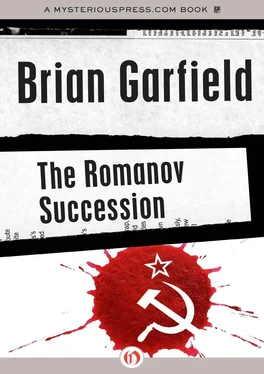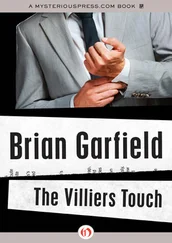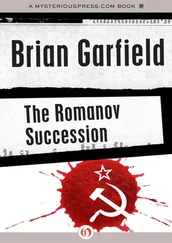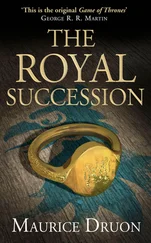Brian Garfield - The Romanov succession
Здесь есть возможность читать онлайн «Brian Garfield - The Romanov succession» весь текст электронной книги совершенно бесплатно (целиком полную версию без сокращений). В некоторых случаях можно слушать аудио, скачать через торрент в формате fb2 и присутствует краткое содержание. Жанр: Политический детектив, на английском языке. Описание произведения, (предисловие) а так же отзывы посетителей доступны на портале библиотеки ЛибКат.
- Название:The Romanov succession
- Автор:
- Жанр:
- Год:неизвестен
- ISBN:нет данных
- Рейтинг книги:4 / 5. Голосов: 1
-
Избранное:Добавить в избранное
- Отзывы:
-
Ваша оценка:
- 80
- 1
- 2
- 3
- 4
- 5
The Romanov succession: краткое содержание, описание и аннотация
Предлагаем к чтению аннотацию, описание, краткое содержание или предисловие (зависит от того, что написал сам автор книги «The Romanov succession»). Если вы не нашли необходимую информацию о книге — напишите в комментариях, мы постараемся отыскать её.
The Romanov succession — читать онлайн бесплатно полную книгу (весь текст) целиком
Ниже представлен текст книги, разбитый по страницам. Система сохранения места последней прочитанной страницы, позволяет с удобством читать онлайн бесплатно книгу «The Romanov succession», без необходимости каждый раз заново искать на чём Вы остановились. Поставьте закладку, и сможете в любой момент перейти на страницу, на которой закончили чтение.
Интервал:
Закладка:
“Sherry.” He’d need a clear head. He settled into a chair.
“I’ve ordered dinner sent up at nine.”
“Have you.”
“We’re having a tryst, aren’t we? It wouldn’t look quite right if we went out and mingled.”
Her mouth curved into a posture of wry self-mockery. She brought him a glass of sherry and then slid back into the couch that faced his chair across the low glass coffee table. She smoothed her skirt under her thighs-the gesture had a strong sensuality. “You look awfully drab in that uniform.”
“Why don’t you tell me what game we’re meant to be playing?”
“So matter-of-fact. Where’s your dash?” She tucked one foot up under her on the couch.
“I’d rather you didn’t try to be coquettish. It doesn’t suit you.”
“Oh dear.” She tossed her hair back, full of subtle mischief. “Now you’ve crushed me. Have I quite lost all my charms?” When she sipped the pale sherry her eyes mocked him over the rim of the glass.
“No.” It was an admission.
“I’m sorry-I wasn’t really fishing for that.” But her eyes went on glittering with amusement; then she said in a different voice, “Very well. They want to see you.”
“They?”
“Your brother. My father. Prince Leon. All of them.”
“Do they.”
“Is that all you can say?”
He watched the way her muscles moved when she set her glass down. “What do you want me to say, Irina?”
“I don’t know. I’ve no feverish desire to put words in your mouth. But some reaction-some hint of feeling. What will it take to provoke an emotion in you?”
“The fact that I don’t parade my feelings doesn’t mean that I don’t have them.”
“You used to burst with fires. That great Russian joie de vivre.”
“We were all children, weren’t we? And it was a different world.”
“You got fed up with seeing us all go on living in international luxury as if nothing had changed. The same old servants and horse races and hunts and chemin-de-fer- all our silly aristocratic posturings while Europe is falling down around our ankles. Isn’t that what you told Prince Leon the last time you saw him?”
“Something like that.”
She uttered a bawdy bark of laughter. “Oh really, Alex. Sometimes you act like one of those grim dedicated adolescents who hang on Oleg Zimovoi’s Socialist coattails.”
He had a disoriented sensation because the silent conversation between their eyes was separate and wholly different from the words: their voices spoke in dispute and accusation; their mute colloquy spoke of passions, regrets, remembered love.
“You’re a Russian. You were born in Kiev-you spent your childhood in St. Petersburg.” She spoke with surprising earnestness and heat: “You can’t deny yourself, Alex. You can’t put that behind you.”
“I have.”
“Your father died fighting for your country.” Her eyes challenged him.
“It was a long time ago,”
His father had been a Marquis, a brigadier with Wrangel in the Ukraine in 1919 and the Red artillery had destroyed the bunker with five of them in it. Alex was twelve years old and the news broke him apart.
They were living near Kiev just then, he and his mother in a rented dacha with only four servants.
The day after the news reached them Alex ran away to Kiev and enlisted in a White recruiting office; he claimed he was sixteen. He was in training barracks resplendent in his new uniform when his mother’s emissaries found him and dragged him home.
They found themselves under General Devenko’s protection when the terrible White retreat began after the collapse of Kolchak’s White armies. Ilya Devenko was a high staff officer in Deniken’s headquarters; he kept the mother and son from perishing in the chaotic horde of refugees fleeing south ahead of Trotsky’s relentless Bolshevik advance. Alex had clear recollection of the packed trains, the endless throngs trudging across the frozen mud of the Ukraine.
General Ilya Devenko had been a very tall man with a voice like lumps of coal crashing down a metal chute. Alex had known him as long as he could remember: the General had been a classmate of Alex’s father, a regular if not frenquent visitor at Danilov soirees before the war. The General’s son Vassily was twice Alex’s age in 1920 and at twenty-six was a full colonel of infantry with an outstanding record of gallantry in the field against the First Red Army.
General Devenko’s wife had died of spotted typhus in the Kuban campaigns of 1918 and perhaps it was inevitable that the widower general should marry Alex’s mother who was a general’s widow. The ceremony took place in Sebastopol in 1921, in the Orthodox Cathedral with Alex giving his mother away and Vassily carrying the ring for his father.
It made Vassily a stepbrother to Alex. Immediately after the wedding Vassily returned to the line to hold the Reds back so that the city could be evacuated aboard ships of the French navy. Alex went aboard a transport reluctantly; they spent his mother’s wedding night in the crowded salon listening to the crashing of the guns. She did not see her new husband again until three weeks later when they were reunited in Istanbul: the newlywed Devenkos, General Deniken, Alex and his stepbrother Vassily, the hero of Sebastopol. With a force which at the end numbered fewer than four hundred men Vassily had kept the Bolsheviks back for a vital eighteen hours while tens of thousands of refugees had been hurried on board the French ships and taken away onto the safety of the Black Sea.
Irina said, “It wasn’t so long ago you can have forgotten it.”
“No.” Twenty years but he could still see the horizon lit by the night barrages; he could feel the sucking mud around his feet and taste the brass of terror on his tongue and he could smell the cold sweat of the refugee mobs clawing at the passing trains. The empty-eyed faces of the soldiers slogging back toward the front; the gnash of Renault ambulances and Daimler-Benz staff cars beating through the cobbled streets, scattering pedestrians; the screams of agony, the stink of suppurating death along the rows of old buildings taken over for hospitals; the taste of dog meat and metallic boiled water; the incongruity-he’d never been able to exorcise it from memory-of a piano heard in a rubbled Sebastopol street while dust hung rancid in the city and 75 mm shells rumbled against the quays. He hadn’t been able to hear Tchaikovsky’s first Piano Concerto since then without nausea.
“No-I haven’t forgotten.”
“You’ve an obligation.”
“To a gang of baccarat and croquet players? To a pack of foolish Romanov Pretenders spending their pointless lives at each other’s throats to claim a throne that doesn’t exist any more?”
“To your brother for one.”
“Vassily Ilyavitch is not my brother.”
“There was a time when you were proud to think he was.”
“That’s an empty refrain, isn’t it? The past doesn’t exist now-not for any of us. There’s no St. Petersburg, there’s only Leningrad.”
An obsequious knock: the boy wheeled in the cart, fussed a while, backed his way out.
Irina lifted the steel domes off the dinner plates. He saw chilled grey Beluga caviar in a bowl at the center. Irina said, “They claim it’s beef stroganoff but I shouldn’t expect too much.”
“I’m used to the Bachelor Officers’ mess hall.”
“How awful.”
He drew up two chairs and when he seated her there was an electric contact where her hair brushed his hand. He went around the table and sat-watching her.
She didn’t chatter; she fell upon the meal. She had always been hearty about everything she did.
She was his own age-thirty-four-almost to the month; but you couldn’t know that by looking at her. Her stunning beauty was in the bones more than the complexion and objectively there would be no way to tell whether she was twenty-five or forty-five.
Читать дальшеИнтервал:
Закладка:
Похожие книги на «The Romanov succession»
Представляем Вашему вниманию похожие книги на «The Romanov succession» списком для выбора. Мы отобрали схожую по названию и смыслу литературу в надежде предоставить читателям больше вариантов отыскать новые, интересные, ещё непрочитанные произведения.
Обсуждение, отзывы о книге «The Romanov succession» и просто собственные мнения читателей. Оставьте ваши комментарии, напишите, что Вы думаете о произведении, его смысле или главных героях. Укажите что конкретно понравилось, а что нет, и почему Вы так считаете.












